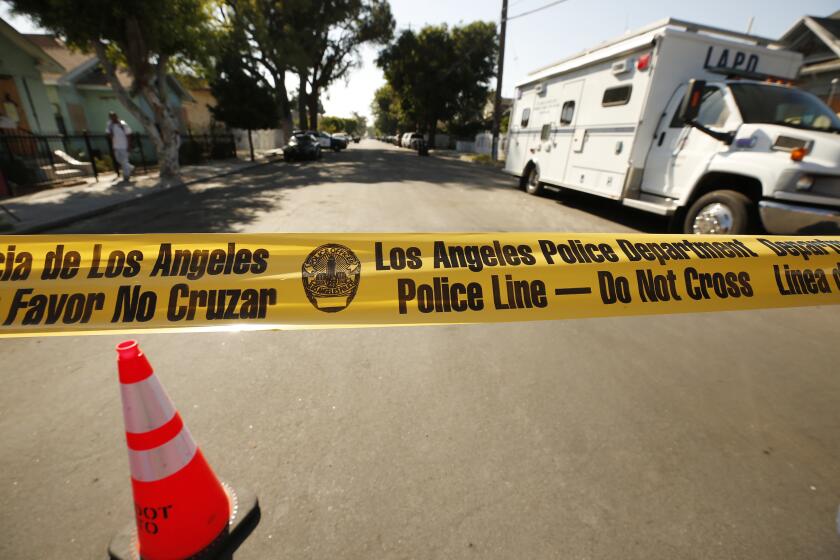Wilson Signs Bill Allowing Arrests Before Crime Is Committed : Law: Civil libertarians say the effort to curb prostitution and drug trade is unconstitutional.
Gov. Pete Wilson has signed a bill intended to crack down on vice and illegal drugs by giving police broad authority to arrest suspected prostitutes, drug dealers and their clients before they commit crimes.
The bill, written by Assemblyman Richard Katz (D-Sylmar), gives police the power to arrest loiterers who officers believe intend to buy or sell sex or drugs on public property. When the bill becomes law Jan. 1, police will be allowed to arrest someone for simply beckoning to cars, talking to passers-by or standing in an area known for drug dealing and prostitution.
Police now have to wait until a law is broken to make drug or prostitution arrests. Next year, they will be allowed to make arrests based on activities they consider precursors to crime--a power strongly opposed by civil libertarians who describe the measure as unconstitutional.
“It’s a powerful tool to help take drug dealers and prostitutes off the streets,” said Katz. He drafted the measure after complaints from residents and business owners in Hollywood and San Fernando Valley neighborhoods that have been plagued by street crime.
“This bill is designed to crack down on those people who contribute to the deterioration of our neighborhoods,” Katz said.
Many residents who have fought for years against street corner sales of sex and drugs celebrated Wilson’s decision.
“In Van Nuys, our problems are exactly what the bill addresses,” said Don Schultz, president of the Van Nuys Homeowners Assn. “We have considerable amounts of drug dealing and prostitution on some of our busier-traveled streets and in high-density low-income housing.”
Schultz said if the law is enforced, he is optimistic it will dramatically curtail street crime. “Any tool that helps law enforcement officers will ultimately allow the community to reap the benefits,” he said.
Signing of the law is a major victory for Los Angeles City Atty. James K. Hahn, who for the last several years has sought stronger tools to fight streetwalking.
“What it means is that prostitutes can no longer just flagrantly and blatantly stand out on a corner and ply their trade,” said Los Angeles Deputy City Atty. Bill Sterling, who helped write the bill. “For the first time police will be able to take prostitutes off the street and effectively stop them. . . . It’s a whole new ballgame.”
The new law--signed by Wilson late Monday--is opposed by the American Civil Liberties Union, criminal defense attorneys and some legal scholars.
“We don’t like it,” said Valerie Small Navarro, a legislative advocate for the California chapter of the ACLU. “It makes legal behavior--even First Amendment constitutionally protected speech--illegal and a crime.”
*
Navarro said she believes that the law will target minorities. “People of color will be more suspect than they already are under the current law,” she said.
USC law professor Erwin Chemerinsky, who testified against the bill during hearings in Sacramento, said he believes a court will eventually declare the legislation unconstitutional because it restricts legal acts.
“There’s undoubtedly concern with both the effect of drug transactions . . . and the effect of loitering for prostitution on neighborhoods,” Chemerinsky said. “Those are understandable concerns. But what’s troubling to me is that I think the governor and the Legislature ignored constitutional concerns.”
Navarro declined to say whether the ACLU plans to challenge the law in court.
Sterling, the city prosecutor, said he anticipates a legal fight, if not by the ACLU then by a defense attorney, once a case is filed under the new law. He said that to ensure such cases can withstand a challenge, his office plans to draft arrest guidelines for police.
“We’re very optimistic. . . . I don’t think we would have gone through all this if we didn’t think we would win in court,” he said.
More to Read
Sign up for Essential California
The most important California stories and recommendations in your inbox every morning.
You may occasionally receive promotional content from the Los Angeles Times.










